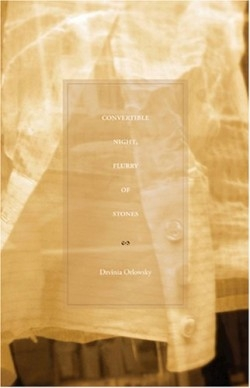Convertible Night, Flurry of Stones
Psychoanalyst and Auschwitz survivor Viktor Frankl described human existence as a search for meaning. He noted that in the absence of meaning, man becomes susceptible to despair, a condition inimical to life. Through words, human beings possess the power to articulate experience that would otherwise remain merely an incoherent jumble of events. To discern meaning in times of profound rupture is a fundamentally creative act—and an insistence on survival. In this way, literature and writing often serve as life-affirming, urgent resources, especially amidst crisis.
Dzvinia Orlowsky’s latest book, Convertible Night, Flurry of Stones, inhabits this potent domain: it is the poetry of survival. With dark lyricism, Orlowsky reports back from doctors’ waiting rooms, the radiation chamber, and the hospital night shift—the stations that mark her journey through breast cancer. A founding editor of Four Way Books, Orlowsky is the author of three previous poetry volumes. Her translation from the Ukranian of Alexander Dovzhenko’s novella, The Enchanted Desna, was published by House Between the Water Press in 2006. She has taught at numerous creative writing programs, including the Mt. Holyoke Writers’ Conference, Emerson College, and Pine Manor College.
According to an African proverb, “The blessing lies next to the wound.” Orlowsky’s work is charged by this volatile, uncomfortable paradox in which trauma and transformation live side-by-side. Her poems unfurl in a winter landscape of illness, where the boundaries blur in half-light between injury and grace, grief and wonder—as in “Listening to Schumann’s Piano Concerto,” where she writes: “We wear our jewels for the afternoon, / startle birds with the immensity / of our human shadows.”
Like fairytales, the poems in this collection are at once magic, lyrical, and earthy. Images of hair and blood recur, evoking an unpredictable wilderness of body and spirit. Where illness threatens to confine, Orlowsky resists entrapment, instead moving toward a larger sense of the world and self. In “Losing My Hair,” she remembers: “I carried some strands to the woods, / spread them on the ground / for the birds to lift / into their nests.” A clump of her fallen hair is “like a small animal” she sets loose among the trees. Venturing into the forest, she is not eaten, sedated, or saved by a prince, but symbolically untethered: “I wrapped the last few strands with some horsehair I’d kept. / A few thick pieces of a black mane I’d pulled riding once, out of fear.” The narrator’s hair—emblem of female sexuality—is entwined with the power of a dark, unruly horse. Although the title suggests relinquishment, this poem also ultimately becomes about retrieval of self.
As in the enchanted world of fables, identity exists in constant flux in Orlowsky’s poems. While cancer patients sometimes report feeling reduced to a fragment of their identity, defined solely by disease, Orlowsky plays with multiple personae—trying on wigs like masks. In the process, the narrator is perpetually evolving and elusive, defying stereotype or label. She rifles through the possibilities of what it means to be female, with equal parts rebellion, bone-dry humor, and dismay: “The first wig makes me look / like an airline ticketing agent. / The second one drives a school bus. / The third one, curling around my mouth, / wants sex. That one couldn’t be worn / near an open oven door.” The narrator alternately changes or takes off her wig (in front of a cop), or loses it (when it falls off at the hair salon), shedding the cheerful, pink-ribbon packaging that is culturally required of women with breast cancer.
“Think of something sad; the music will come,“ the piano teacher tells Orlowsky’s son in “Kabelevsky’s Concerto,” as he tries to practice the new piece. In a societal environment that is intensely wary even of the aging human face, elements of the human emotional repertoire are suppressed—arguably none more so than the experience of grief. Orlowsky listens to the stillness in the shadows, and in that quiet place, she discerns the music, and learns it by heart. In “December,” a poem about her elderly mother, she writes: “Be still, / ants cast lions’ shadows to entertain themselves, / branches scrape music against windows, / each day prognosticated— / living as if.”
Perhaps grief, because it makes clear the value of what might be lost, is one of the essential experiences that carries us, like music, toward meaning. Orlowsky’s poems about illness possess the necessary audacity to be fully human, with the insistence on missing absolutely nothing—at once beautiful and broken; magnificent and terrified: “Be fractured, discharged, come down / lightly as the first snowfall / white points, torches in your hands.” This new collection of Orlowsky’s work makes for fiercely memorable, essential reading.
Reviewed by
Melanie Drane
Disclosure: This article is not an endorsement, but a review. The publisher of this book provided free copies of the book to have their book reviewed by a professional reviewer. No fee was paid by the publisher for this review. Foreword Reviews only recommends books that we love. Foreword Magazine, Inc. is disclosing this in accordance with the Federal Trade Commission’s 16 CFR, Part 255.

